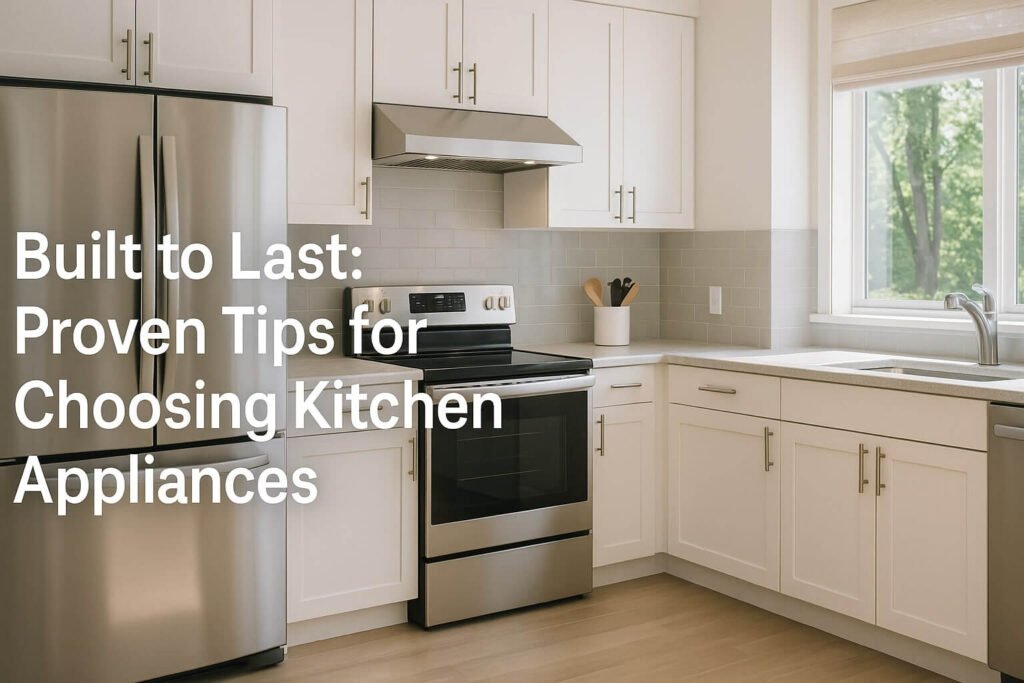Every home cook knows the quiet satisfaction of opening a refrigerator that hums steadily through the years—or loading a dishwasher that just works, no fuss, no leaks. But in today’s world of touchscreens, subscription-connected features, and endless stainless steel, choosing kitchen appliances that actually last can feel like navigating a maze. The stakes are high. A poor decision could mean spending hundreds (or thousands) on repairs—or worse, a full replacement—years earlier than expected.
So how do you know which appliances will go the distance? After diving deep into reliability ratings, repair forums, and expert testing labs, we’ve put together a smart, grounded guide for buying kitchen gear that can stand the test of time.
1. Look Past the Shine—Trust Brand Track Records
Not all brands are created equal. Some are masters at marketing, others are masters at making machines that just keep running. Trusted consumer groups like Consumer Reports and Good Housekeeping consistently praise brands like Miele, Bosch, Whirlpool, LG, and GE Profile—especially for refrigerators, dishwashers, and ranges.
The real gold here is repair history. Brands that design machines to be serviceable (with parts that remain available a decade later) are the ones you’ll want in your home. So before clicking “Buy Now,” take ten minutes to check the latest reliability rankings.
2. Know What to Expect From Each Appliance Type
Different appliances have different average lifespans:
- Refrigerators: ~12 years
- Gas ranges: ~15 years
- Dishwashers: ~10 years
- Microwaves: ~8 years
If your household runs hot meals every day or has lots of traffic in the kitchen, even these numbers can drop. It’s smart to budget for future replacements now—maybe set aside a bit monthly—so you’re not caught off guard when your fridge finally calls it quits.
3. Fewer Features = More Years
It’s tempting to go for the fridge with the glowing door, the Bluetooth speaker, or the one that tells you the weather. But each added feature is another point of failure. Ice makers, touchscreen panels, retractable shelves—these all tend to break before the compressor ever does.
Instead, prioritize build quality:
- Stainless steel tubs in dishwashers
- Solid hinges and metal parts
- Simpler controls
Basic often means better—especially when you’re after longevity.
4. Energy Efficiency Can Hint at Long-Term Design
Look for the ENERGY STAR label. It doesn’t just mean your appliance is better for your utility bill—it also suggests the brand has done rigorous internal testing. Some even publicly state that their appliances are built to last 10 or 12 years under standard use.
And better insulation and smart inverter tech? That’s not just about savings. It also reduces the strain on motors and boards, helping them last longer.
5. Don’t Overpay for Warranties
Most appliances come with a standard one-year labor warranty and longer coverage (sometimes 10 years) on sealed parts. Extended warranties often sound appealing but rarely pay off—especially for trusted brands. Instead, invest that money in a quality surge protector and stick to routine maintenance.
Before buying, always read the warranty terms. Some won’t cover family-sized use (yep, that’s a loophole). Others require you to use authorized service providers that may not exist in your area.
6. Space, Power, and Ventilation Matter More Than You Think
One of the top killers of modern kitchen appliances? Bad installation. If your fridge is shoved too close to the wall or a range is installed without enough ventilation, even the best models can overheat and fail.
Here’s what to keep in mind:
- Leave at least 2–3 inches of clearance behind and around fridges.
- Check power demands. Many induction stoves need a 40-amp circuit.
- Make sure doors and drawers can open fully in tight kitchens.
Compact kitchens? Go for drawer-style dishwashers or counter-depth appliances—they may be smaller, but they’re designed to last in tight spaces.
7. Maintenance Isn’t Optional
You don’t need to be an appliance whisperer. Just take a few minutes each week or month:
- Clean your fridge coils twice a year.
- Wipe dishwasher gaskets monthly.
- Replace water filters as scheduled.
- Keep ventilation clear.
Even these small steps can add years to your appliance’s life.
8. Choose a Brand With a Strong Service Network
Before buying a high-end European model, make sure someone local can actually fix it. A quick call to a local appliance repair shop can save you a major headache later. Ask:
- “Do you stock parts for this brand?”
- “How long is your average repair time for this model?”
If the answer is crickets, maybe skip the fancy import and go for something easier to maintain.
9. Use This Durability-First Shortlist When Shopping
✔ Check independent reliability ratings (Consumer Reports, GH Lab)
✔ Look for 10–12 year expected life in tech sheets
✔ Choose stainless steel interiors, strong hinges, fewer moving parts
✔ Avoid unnecessary add-ons like smart screens and dispensers
✔ Confirm local repair services are available
✔ Schedule basic maintenance tasks in your calendar
One Last Word About “Smart” Appliances
Smart fridges are fun… until they glitch. Right now, those Wi-Fi boards don’t have the same track record as the rest of the hardware. Until that tech matures, consider smart features a bonus, not a must-have. Reliability still lies in the fundamentals.
Choosing kitchen appliances that last doesn’t mean skipping style or going completely analog. It just means taking a smarter, long-game approach. Your future self—especially the one hosting family dinners five years from now—will thank you for the solid choices made today.


